|
|
|
Sort Order |
|
|
|
Items / Page
|
|
|
|
|
|
|
| Srl | Item |
| 1 |
ID:
157903
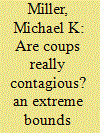

|
|
|
|
|
| Summary/Abstract |
Protests and democratic transitions tend to spread cross-nationally. Is this true of all political events? We argue that the mechanisms underlying the diffusion of mass-participation events are unlikely to support the spread of elite-led violence, particularly coups. Further, past findings of coup contagion employed empirical techniques unable to distinguish clustering, common shocks, and actual diffusion. To investigate which events diffuse and where, we combine modern spatial dependence models with extreme bounds analysis (EBA). EBA allows for numerous modeling alternatives, including diffusion timing and the controls, and calculates the distribution of estimates across all combinations of these choices. We also examine various diffusion pathways, such as contagion among trade partners. Results from nearly 1.2 million models clearly undercut coup contagion. In comparison, we confirm that more mass-driven political events robustly spread cross-nationally. Our findings contribute to studies of political conflict and contagion, while introducing EBA as an effective tool for diffusion scholars.
|
|
|
|
|
|
|
|
|
|
|
|
|
|
|
|
| 2 |
ID:
121669
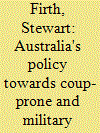

|
|
|
|
|
| Publication |
2013.
|
| Summary/Abstract |
Events in Thailand, Fiji and Burma in 2006 and 2007 focused attention on Australia's foreign policy response to regional coup-prone states and military regimes. Australia's official reaction to these events took different forms: for Thailand, a mild rebuke that brought no change in Thai-Australian relations; for Fiji, condemnation, the imposition of sanctions and a call for the people of Fiji to rebel; and for Burma, a change of policy that brought financial sanctions against the military regime. This article argues that, in responding to these regimes in different ways, Australian governments act on the basis of differing prisms of understanding through which they assess regions and states. The differences ultimately arise from calculations of Australian national security, strategic interests, alliance maintenance and power potential, but tend to be obscured by the universalist rhetoric of promoting democracy and protecting human rights, to which Australian governments subscribe. As the security dynamic in the Asia-Pacific changes as a consequence of the rise of China, Australian policy towards coup-prone states and military regimes in the region is likely to favour stability over democracy or the protection of human rights.
|
|
|
|
|
|
|
|
|
|
|
|
|
|
|
|
| 3 |
ID:
160536


|
|
|
|
|
| Summary/Abstract |
I advance and test a theoretical argument of how participation in UN peacekeeping affects the likelihood of coup attempts in troop-contributing countries (TCCs). The argument highlights the interplay between the economic incentives of militaries in poor TCCs and the UN’s preference for contributors with stable civil–military relations. Fearing the loss of UN reimbursement funds, militaries for which such funds are important will avoid visible acts of military insubordination, such as coup attempts, that would place their future participation in UN peacekeeping at risk. I test this proposition against time-series cross-sectional data on 157 countries in the 1991–2013 period using panel regression and matching. The data show that countries where the armed forces are more dependent on peacekeeping revenues experience fewer coup attempts than comparable peers, even when taking coup-proofing measures and other alternative explanations into account. I also find that the coup-restraining effect is only observed in periods where member states contribute enough troops to award the UN a real choice over alternative contributors. The study introduces a novel theoretic logic, presents empirical results at odds with the existing literature, and suggests important policy implications with regard to UN vetting and standards for troop-contributing countries.
|
|
|
|
|
|
|
|
|
|
|
|
|
|
|
|
| 4 |
ID:
106030
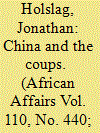

|
|
|
|
|
| Publication |
2011.
|
| Summary/Abstract |
However destabilizing illegitimate regime changes are for Africa, they have not caused China to change its policies. Examining five coups that occurred in Africa between 2003 and 2010, this article argues that China did not see the coups as major threats to its interests, but accepted instability as a part of doing business in Africa. China remained sceptical of democracy as an antidote to instability and deeply distrusted the effort of Western countries to promote liberal political standards. China therefore continued to display conservative self-restraint, a preference for unilateralism, and a pragmatic mercantilist policy intended to strengthen its economic presence. If China is guided by any strategy, it is the strategy of adapting to political realities, rather than trying to shape them.
|
|
|
|
|
|
|
|
|
|
|
|
|
|
|
|
| 5 |
ID:
188999
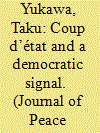

|
|
|
|
|
| Summary/Abstract |
What connection exists between protests and coup attempts? Although recent studies have revealed that the former incites the latter, they generally do not consider international factors. We contend that post-Cold War nonviolent protests have promoted coup attempts. With sentiment in the international community turning against coups following the end of the Cold War, coup organizers have had to portray their actions as democratic. Launching a coup attempt during ongoing nonviolent protests became a convincing method to prove democratic bona fides. This is because the international community favors nonviolence, and it signals that the emerging regime will not have extreme preferences and will keep order. Conversely, the international community does not regard violent protests as legitimate, and staging a coup attempt during violent protests will not enable a military to claim legitimacy. This argument is tested through statistical analysis and by using the 2011 Egyptian coup as a case study. As expected, the results indicate that the impact of protests on coup attempts varies depending on (1) whether those protests are violent or nonviolent, and on (2) the period. Specifically, only the nonviolent protests in the post-Cold War era prompt coup attempts meaningfully.
|
|
|
|
|
|
|
|
|
|
|
|
|
|
|
|
| 6 |
ID:
151112
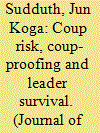

|
|
|
|
|
| Summary/Abstract |
Under what conditions do political leaders enact ‘coup-proofing’ strategies? There is a broad consensus in the literature that political leaders who face a higher risk of a coup will employ coup-proofing strategies that reduce the military’s capabilities to organize a coup. A closer look at the theory and empirical analyses of earlier studies, however, suggests that the presumed relationship between coup risk and coup-proofing should be re-examined. Drawing on insights from formal studies of authoritarian power-sharing, this article proposes that political leaders become less likely to initiate coup-proofing efforts as the coup risk increases. The reason is that leaders’ coup-proofing actions in themselves could prompt the military to launch a coup and thus political leaders will hesitate to offend officers when they face a high risk of a coup. The statistical models in this article estimate a latent coup risk by aggregating multiple indicators that capture the military’s willingness and ability to organize a coup. The empirical results strongly support the proposition that coup-proofing efforts taken by leaders decrease as coup risk increases.
|
|
|
|
|
|
|
|
|
|
|
|
|
|
|
|
| 7 |
ID:
121663
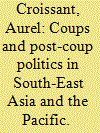

|
|
|
|
|
| Publication |
2013.
|
| Summary/Abstract |
The 2006 coups in Fiji and Thailand-as well as the 2012 incident in Papua New Guinea-have sent timely reminders that military coups remain a threat to vulnerable democracies in South-East Asia and the Pacific. This article explores the interplay between structural factors that can create coup risks, the 'coup-proofing' strategies of political leaders and the occurrence of military coups. While the article examines the region as a whole, it pays particular attention to Myanmar (Burma), Thailand, Indonesia, Fiji and Papua New Guinea. Borrowing from the work of Belkin and Schofer, it argues that the level of coup risk in each country can be assessed by analysing the extent of regime legitimacy, the strength of civil society and the frequency of military coups in the past. By combining this analysis with an evaluation of coup-proofing strategies, the study discusses likely scenarios for the five focus countries as far as the likelihood of coups or, alternatively, the establishment of stable civilian control is concerned.
|
|
|
|
|
|
|
|
|
|
|
|
|
|
|
|
| 8 |
ID:
121662
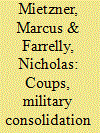

|
|
|
| 9 |
ID:
129191
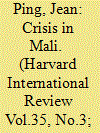

|
|
|
|
|
| Publication |
2014.
|
| Summary/Abstract |
In order to better understand what happened in Mali in 2012 and to seek appropriate solutions to the major obstacles facing this country, it is necessary to recall the nature and causes of the numerous challenges confronting the nation. these vital concerns relate to ethnicity, secession, terrorism, coups, governance, poverty, corruption, drought and climate change. These factors affect not only Mali but also represent obstacles faced by a multitude of other countries on the continent. However, in the case of Mali, these issues were all brought together in the same place and brutally erupted at the same time during the course of the year 2012, provoking disintegration and the subsequent French military intervention.
|
|
|
|
|
|
|
|
|
|
|
|
|
|
|
|
| 10 |
ID:
103866
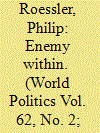

|
|
|
|
|
| Publication |
2011.
|
| Summary/Abstract |
Why do rulers employ ethnic exclusion at the risk of civil war? Focusing on the region of sub-Saharan Africa, the author attributes this costly strategy to the commitment problem that arises in personalist regimes between elites who hold joint control of the state's coercive apparatus. As no faction can be sure that others will not exploit their violent capabilities to usurp power, elites maneuver to protect their privileged position and safeguard against others' first-strike capabilities. Reciprocal maneuvering, however, reinforces suspicion and increases intrigue within the regime, undermining trust and often triggering a security dilemma. In the face of a rising internal threat, rulers move to eliminate their rivals to guarantee their personal and political survival. But the cost of such a strategy, especially when carried out along ethnic lines, is that it increases the risk of a future civil war. To test this argument, the author employs the Ethnic Power Relations data set combined with original data on the ethnicity of conspirators of coups and rebellions in Africa. He finds that in Africa ethnic exclusion substitutes civil war risk for coup risk. And rulers are significantly more likely to exclude their coconspirators-the very friends and allies who helped them come to power-than other included groups, but at the cost of increasing the risk of a future civil war with their former allies. In the first three years after being purged from the central government, coconspirators and their coethnics are sixteen times more likely to rebel than when they were represented at the apex of the regime.
|
|
|
|
|
|
|
|
|
|
|
|
|
|
|
|
| 11 |
ID:
177066
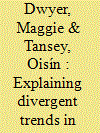

|
|
|
|
|
| Summary/Abstract |
Coups and mutinies have often been treated as broadly equivalent types of behavior. However, they are distinct forms of indiscipline carried out by different sets of actors and have fundamentally distinct goals. This article makes two contributions to the scholarship on both coups and mutinies. First, we offer the first systematic attempt to compare their rates and illustrate the difference in their frequency over time, drawing on data from West and Central Africa. In particular, we identify a striking divergence in the frequency of coups and mutinies over time as well as a set of fluctuations that coincide with the end of the Cold War. Second, we build a new theory to explain these divergent trends. We focus on the role of agency within the military and argue that the upheavals associated with the end of the Cold War were experienced in different ways by junior and senior ranks within armed forces. This, in turn, helps account for variation in the coup and mutiny attempts.
|
|
|
|
|
|
|
|
|
|
|
|
|
|
|
|
| 12 |
ID:
193632
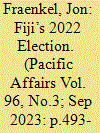

|
|
|
|
|
| Summary/Abstract |
An election held under semi-authoritarian conditions in Fiji in December 2022 saw a narrow defeat for coup leader Frank Bainimarama’s incumbent FijiFirst Party. This paper looks at the political parties, the campaign issues, and the results. It argues that fear of yet another coup, as occurred in 1987, 2000, and 2006, was a critical factor determining election outcomes in 2014 and 2018, but a credible rejection of that option by the Republic of Fiji Military Forces in 2022 and an opposition campaign that could no longer be depicted as ethno-nationalist paved the way for regime change in Fiji.
|
|
|
|
|
|
|
|
|
|
|
|
|
|
|
|
| 13 |
ID:
186819


|
|
|
|
|
| Summary/Abstract |
Because existing issue classification schemes omit prominent issues (e.g., domestic armed conflict) or contain significant within-category heterogeneity, theorizing about the role of issues in international conflict processes has stagnated. Our project jump-starts it again, by independently—and systematically—reconceptualizing and gathering data on five issues connected to dyadic militarized interstate disputes (MIDs) during the period 1900–2010: land (borders), maritime (borders), islands, civil conflict, and coups. After conceptually introducing these issues and embedding them within a larger framework, we describe and apply our MID-Issue data. These efforts show that (i) the MID dataset’s issue classification scheme does not systematically capture our issues, (ii) events in 37.58% of dyadic MIDs connect to domestic armed conflict—a prevalence not on the field’s radar, (iii) some factors promote issue-based international conflict, but only via indirect channels, and (iv) significant value even derives from a further conceptualization of “territorial issues” (broadly defined).
|
|
|
|
|
|
|
|
|
|
|
|
|
|
|
|
| 14 |
ID:
165263
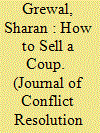

|
|
|
|
|
| Summary/Abstract |
Unlike other political leaders, leaders coming to power through military coups face a dual legitimation challenge: they must justify not only why they should rule but also how they came to power. Little attention has been paid to how coup leaders solve this legitimacy deficit and even less to the audiences of this legitimation. We ask: why do some coup leaders legitimate their coups by holding elections while others do not? Counterintuitively, we argue that coup leaders who oust democratically elected leaders are less likely to hold elections, except when tied to US military aid. We test these hypotheses through a data set of military coup regimes from 1946 to 2014 and trace out mechanisms through case studies of the Nigerian coup of 1983 and the Egyptian coup of 2013. This argument provides a new explanation for the emergence of authoritarian elections and a new perspective on the international dimensions of dictatorship.
|
|
|
|
|
|
|
|
|
|
|
|
|
|
|
|
| 15 |
ID:
180074
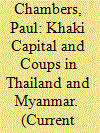

|
|
|
|
|
| Summary/Abstract |
Military-run business activities can turn into an unrestrained form of parasitic capitalism, preying on national economies. The militaries of Thailand and Myanmar have evolved as predatory “khaki capitalist” institutions. Thailand’s military, deriving its legitimacy as guardian of the monarchy, has used that role to justify its accumulation of economic resources. Myanmar’s military, in power for most of the decades since independence, has invoked national security to expand its budget and business interests. Both militaries have repeatedly employed coups to consolidate their economic power, most recently in 2014 in Thailand and 2021 in Myanmar. Fragile democratic governments and international sanctions have proved ineffective in restraining them.
|
|
|
|
|
|
|
|
|
|
|
|
|
|
|
|
| 16 |
ID:
152295
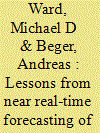

|
|
|
|
|
| Summary/Abstract |
Since 2014, we have been producing regular six-month forecasts of the probability of irregular leadership changes – coups, rebellions, protests that result in state leader changes – for most countries in the world for the Political Instability Task Force (PITF). During 2015, we issued new forecasts each month, with a delay as short as five days and no longer than two weeks into each six-month forecasting window. This article describes the approach we use to generate our forecasts and presents several examples of how we present forecasts. The forecasts are derived from a statistical ensemble of seven thematic models, each based on a split-population duration model that aims to capture a specific argument or related set of covariates. This approach is modular in that thematic models can be swapped out or new models integrated, and it lessens the need for generalist ‘kitchen sink’ models. Together, the models achieve high out-of-sample accuracy. Based on our experience, we draw conclusions about the practical, policy, and scientific aspects of this and similar undertakings. These include thoughts on how to evaluate and present forecasts, the potential role of ensembles in model comparison, the role of ensembles and prediction in causal research, and considerations for future efforts in forecasting and predictive modeling.
|
|
|
|
|
|
|
|
|
|
|
|
|
|
|
|
| 17 |
ID:
147489
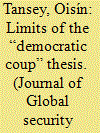

|
|
|
|
|
| Summary/Abstract |
Recent studies have suggested that post–Cold War coups are more likely to be followed by democratic elections than their Cold War predecessors; analysts attribute this trend to international policies of democratic conditionality. Some go so far as to argue that we live in an age of the “democratic coup.” This paper raises questions over any optimistic view of the capacity of coups to contribute to long-term democratization. An analysis of countries’ post-coup trajectories after 1991 demonstrates that there is, consistent with previous studies, a clear trend of holding elections within five years of the coup. However, I show that most countries experiencing coups fail to go on to establish high-quality democratic rule. Instead, they often consolidate into some form of authoritarian rule. The paper ratifies the importance of the international political environment but highlights the role of international autocratic sponsors. When states are strategically important or have strong linkages to non-Western autocracies, coup leaders are likely to receive international support and protection rather than condemnation and sanctions. The article illustrates these arguments by examining post-coup authoritarian consolidation in Egypt and Fiji.
|
|
|
|
|
|
|
|
|
|
|
|
|
|
|
|
| 18 |
ID:
081227
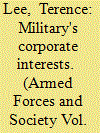

|
|
|
|
|
| Publication |
2008.
|
| Summary/Abstract |
"Civil-Military Relations in Indonesia and the Philippines," Mark Beeson argued that the likelihood of future military interventions in Indonesia and the Philippines was best understood by examining the countries' political economies. Beeson contended that because the Indonesian military remains heavily involved in economic activities, it will likely remain politically quiescent. And because fewer opportunities exist for the Philippine military to engage in business undertakings, the specter of further military interventions remains. Beeson's argument is characteristic of the corporate interest perspective in the civil-military relations literature. This article examines the effectiveness of corporate interest arguments in explaining military interventions into the political arena. It advances two main arguments: first, corporate interest propositions are under-specified and not analytically useful to explain military interventions. Second, by concentrating on the corporate interests of the Indonesian and Philippine militaries, Beeson omitted more salient factors that have led to prior interventions in the two countries
|
|
|
|
|
|
|
|
|
|
|
|
|
|
|
|
| 19 |
ID:
121668
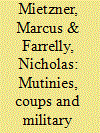

|
|
|
|
|
| Publication |
2013.
|
| Summary/Abstract |
Scholars of civil-military relations have long been puzzled by the fact that despite a series of mutinies, Papua New Guinea (PNG) has never seen a full-blown military takeover. Indeed, when PNG became independent in the early 1970s, some veteran PNG watchers had predicted that the country was likely to follow in the footsteps of many coup-prone African countries. In this article, the authors highlight the reasons for the surprising absence of coups in PNG by comparing the country to three South-East Asian nations that have experienced coups. By contrasting PNG with Indonesia, Burma and Thailand, the authors identify five key factors that have prevented coups in the former and facilitated them in the latter: first, the role that the military played in the struggle for independence or modern statehood; second, the size of the armed forces; third, the military's organisational capacity; fourth, geographical conditions and the military's command structure; and finally, the general relationship between civilian and military elites.
|
|
|
|
|
|
|
|
|
|
|
|
|
|
|
|
| 20 |
ID:
143534
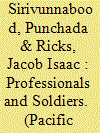

|
|
|
|
|
| Summary/Abstract |
Thailand’s military has recently reclaimed its role as the central pillar of Thai politics. This raises an enduring question in civil-military relations: why do people with guns choose to obey those without guns? One of the most prominent theories in both academic and policy circles is Samuel Huntington’s argument that professional militaries do not become involved in politics. We engage this premise in the Thai context. Utilizing data from a new and unique survey of 569 Thai military officers as well as results from focus groups and interviews with military officers, we evaluate the attitudes of Thai servicemen and develop a test of Huntington’s hypothesis. We demonstrate that increasing levels of professionalism are generally poor predictors as to whether or not a Thai military officer prefers an apolitical military. Indeed, our research suggests that higher levels of professionalism as described by Huntington may run counter to civilian control of the military. These findings provide a number of contributions. First, the survey allows us to operationalize and measure professionalism at the individual level. Second, using these measures we are able to empirically test Huntington’s hypothesis that more professional soldiers should prefer to remain apolitical. Finally, we provide an uncommon glimpse at the opinions of Thai military officers regarding military interventions, adding to the relatively sparse body of literature on factors internal to the Thai military which push officers toward politics
|
|
|
|
|
|
|
|
|
|
|
|
|
|
|
|
|
|
|
|
|